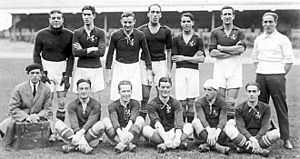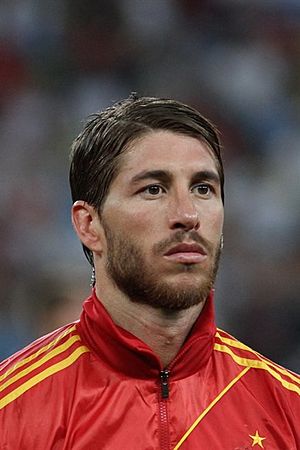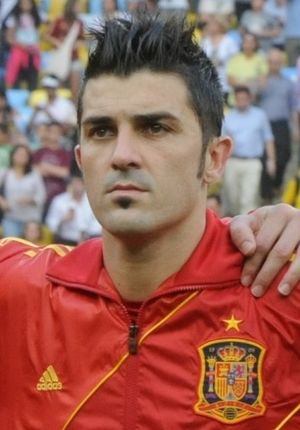Spain national football team facts for kids
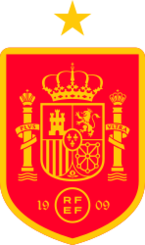 |
|||||||||||||||||||||||||||||||||||||||||||||||||||||||||||
| Nickname(s) | La Roja (The Red One) | ||||||||||||||||||||||||||||||||||||||||||||||||||||||||||
|---|---|---|---|---|---|---|---|---|---|---|---|---|---|---|---|---|---|---|---|---|---|---|---|---|---|---|---|---|---|---|---|---|---|---|---|---|---|---|---|---|---|---|---|---|---|---|---|---|---|---|---|---|---|---|---|---|---|---|---|
| Association | Real Federación Española de Fútbol (RFEF) | ||||||||||||||||||||||||||||||||||||||||||||||||||||||||||
| Confederation | UEFA (Europe) | ||||||||||||||||||||||||||||||||||||||||||||||||||||||||||
| Head coach | Luis de la Fuente | ||||||||||||||||||||||||||||||||||||||||||||||||||||||||||
| Captain | Álvaro Morata | ||||||||||||||||||||||||||||||||||||||||||||||||||||||||||
| Most caps | Sergio Ramos (180) | ||||||||||||||||||||||||||||||||||||||||||||||||||||||||||
| Top scorer | David Villa (59) | ||||||||||||||||||||||||||||||||||||||||||||||||||||||||||
| Home stadium | Various | ||||||||||||||||||||||||||||||||||||||||||||||||||||||||||
| FIFA code | ESP | ||||||||||||||||||||||||||||||||||||||||||||||||||||||||||
|
|||||||||||||||||||||||||||||||||||||||||||||||||||||||||||
| FIFA ranking | |||||||||||||||||||||||||||||||||||||||||||||||||||||||||||
| Current | 9 |
||||||||||||||||||||||||||||||||||||||||||||||||||||||||||
| Highest | 1 (July 2008 – June 2009, October 2009 – March 2010, July 2010 – July 2011, October 2011 – July 2014) | ||||||||||||||||||||||||||||||||||||||||||||||||||||||||||
| Lowest | 25 (March 1998) | ||||||||||||||||||||||||||||||||||||||||||||||||||||||||||
| Elo ranking | |||||||||||||||||||||||||||||||||||||||||||||||||||||||||||
| Current | 2 |
||||||||||||||||||||||||||||||||||||||||||||||||||||||||||
| Highest | 1 (September 1920 – May 1924, September – December 1925, June 2008 – June 2009, July 2010 – June 2013) | ||||||||||||||||||||||||||||||||||||||||||||||||||||||||||
| Lowest | 19 (June–October 1969, November 1991) | ||||||||||||||||||||||||||||||||||||||||||||||||||||||||||
| First international | |||||||||||||||||||||||||||||||||||||||||||||||||||||||||||
(Forest, Belgium; 28 August 1920) |
|||||||||||||||||||||||||||||||||||||||||||||||||||||||||||
| Biggest win | |||||||||||||||||||||||||||||||||||||||||||||||||||||||||||
(Madrid, Spain; 22 August 1933) |
|||||||||||||||||||||||||||||||||||||||||||||||||||||||||||
| Biggest defeat | |||||||||||||||||||||||||||||||||||||||||||||||||||||||||||
(Amsterdam, Netherlands; 4 June 1928) (London, England; 9 December 1931) |
|||||||||||||||||||||||||||||||||||||||||||||||||||||||||||
| World Cup | |||||||||||||||||||||||||||||||||||||||||||||||||||||||||||
| Appearances | 16 (first in 1934) | ||||||||||||||||||||||||||||||||||||||||||||||||||||||||||
| Best result | Champions (2010) | ||||||||||||||||||||||||||||||||||||||||||||||||||||||||||
| European Championship | |||||||||||||||||||||||||||||||||||||||||||||||||||||||||||
| Appearances | 12 (first in 1964) | ||||||||||||||||||||||||||||||||||||||||||||||||||||||||||
| Best result | Champions (1964, 2008, 2012, 2024) | ||||||||||||||||||||||||||||||||||||||||||||||||||||||||||
| Nations League Finals | |||||||||||||||||||||||||||||||||||||||||||||||||||||||||||
| Appearances | 3 (first in 2021) | ||||||||||||||||||||||||||||||||||||||||||||||||||||||||||
| Best result | Champions (2023) | ||||||||||||||||||||||||||||||||||||||||||||||||||||||||||
| CONMEBOL–UEFA Cup of Champions | |||||||||||||||||||||||||||||||||||||||||||||||||||||||||||
| Appearances | 1 (first in 2026) | ||||||||||||||||||||||||||||||||||||||||||||||||||||||||||
| Best result | Debut (2026) | ||||||||||||||||||||||||||||||||||||||||||||||||||||||||||
| Confederations Cup | |||||||||||||||||||||||||||||||||||||||||||||||||||||||||||
| Appearances | 2 (first in 2009) | ||||||||||||||||||||||||||||||||||||||||||||||||||||||||||
| Best result | Runners-up (2013) | ||||||||||||||||||||||||||||||||||||||||||||||||||||||||||
|
Medal record
|
|||||||||||||||||||||||||||||||||||||||||||||||||||||||||||
The Spain national football team (called Selección Española de Fútbol in Spanish) represents Spain in international men's football games. It has been doing so since 1920. The team is managed by the Royal Spanish Football Federation.
Spain is one of only eight teams to have won the FIFA World Cup. They have played in 16 World Cups out of 22. Spain won the World Cup in 2010. They have also played in 12 out of 17 European Championships. Spain is the current European champion, winning their fourth title in 2024.
After winning the 2023 UEFA Nations League, Spain became the second team ever to win three major titles: the World Cup, European Championship, and Nations League. Spain is also one of only two countries, along with Germany, to have won both the men's and women's World Cups.
Since 2008, Spain has been the most successful European national team. They have won one World Cup, one Nations League, and four European Championship titles. Many experts believe the Spanish teams from 2008 to 2012 were among the best in football history. During this time, Spain was the first team to win three major titles in a row. This included two European Championships back-to-back in 2008 and 2012. They were also the first European team to win a World Cup held outside Europe. From 2008 to 2013, Spain was named the FIFA Team of the Year six times. This is the second-highest number for any nation, after Brazil. From 2007 to 2009, Spain went 35 matches without losing. This was a record for football at the time, shared with Brazil.
Contents
History of Spain's Football Team
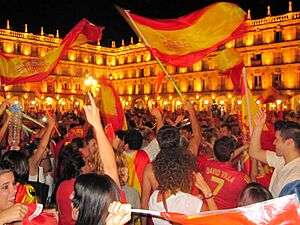
Spain joined FIFA when it was founded in 1904. The Spanish Football Federation started in 1909. The first Spain national football team was formed in 1920. Their goal was to represent Spain at the 1920 Summer Olympics in Belgium. Spain played their first game on August 28, 1920, against Denmark. They won 1–0 and eventually earned the silver medal at the Olympics.
Spain played in their first FIFA World Cup in 1934. They beat Brazil in their first game. They then lost to the host team, Italy, in the quarter-finals. The Spanish Civil War and World War II stopped Spain from playing many games between 1934 and 1950. In the 1950 World Cup in Brazil, Spain finished fourth. This was their best World Cup result until 2010.
Spain won its first big international title in 1964. They hosted the 1964 European Nations' Cup and beat the Soviet Union 2–1 in the final. This was Spain's only major title for 44 years. Spain hosted the 1982 FIFA World Cup and reached the second round. Four years later, in 1986, they reached the quarter-finals but lost to Belgium in a penalty shootout. At UEFA Euro 1984, they lost the final to France.
In the 2002 World Cup, Spain won all three of their group games. They then beat Republic of Ireland on penalties. In the quarter-finals, they lost to co-hosts South Korea in a shootout.
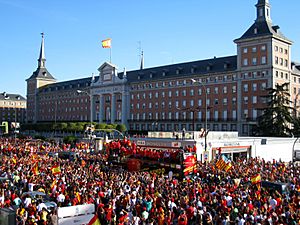
At UEFA Euro 2008, Spain won all their games in the group stage. They beat Italy 4–2 on penalties in the quarter-finals. Then, they beat Russia 3–0 in the semi-finals. In the final, Spain defeated Germany 1–0. This was Spain's first major title since 1964. Xavi was named the best player of the tournament.
The next year, Spain finished third at the 2009 FIFA Confederations Cup. This ended their 35-match unbeaten streak. In the 2010 World Cup, Spain reached the final for the first time. They beat Germany 1–0 in the semi-finals. In the final against the Netherlands, Andrés Iniesta scored the only goal in extra time. Spain became the third team to win a World Cup outside their own continent. They were also the first European team to do so.
Spain then qualified for UEFA Euro 2012 with a perfect record. They became the first team to win the European Championship twice in a row. They won the final 4–0 against Italy. Fernando Torres was the top scorer of the tournament.
Spain reached the final of the 2013 FIFA Confederations Cup but lost to hosts Brazil. In the 2014 World Cup, they were eliminated in the group stage. At Euro 2016 and the 2018 World Cup, Spain reached the last 16. They lost to Italy in 2016 and Russia in 2018 (on penalties).
In UEFA Euro 2020 (played in 2021), Spain reached the semi-finals for the first time since 2012. They lost to Italy on penalties. In the 2022 World Cup, Spain lost to Morocco 3–0 on penalties in the round of 16.
Spain finished first in their group at UEFA Euro 2024 without letting in any goals. They beat Georgia 4–1 in the round of 16. They then beat hosts Germany 2–1 in the quarter-finals. In the semi-finals, they defeated France 2–1. Spain won their record-breaking fourth European title by beating England 2–1 in the final. They became the first team to win all seven matches in a single European Championship. They also scored a record 15 goals in the tournament.
Spain continued their success in the 2024–25 UEFA Nations League. They reached the finals and beat the Netherlands and then France in the semi-finals. This was their second Nations League final in a row. Spain has gone 23 official matches without losing. Their last loss was against Scotland in March 2023.
Team Image and Style
Nicknames for the Team
In the past, Spain's team was sometimes called "La furia española", which means "the Spanish Fury". This name came from a Dutch newspaper, remembering a historical event. Today, the team is more commonly known as "La roja", meaning "the Red (squad)".
How Spain Plays Football
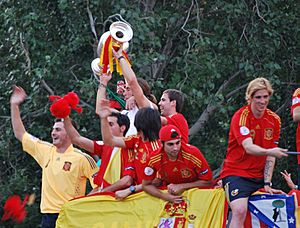
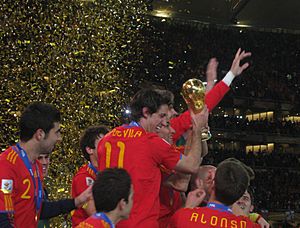
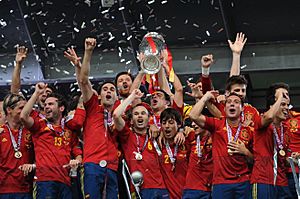
Between 2008 and 2012, the team played a style of football called 'tiki-taka'. This style focuses on teamwork and understanding how to use space on the field.
Tiki-taka means moving the ball with short passes and lots of player movement. It's about carefully moving the ball through different areas of the field. It also means keeping the ball and being patient. Players move around and swap positions, passing the ball quickly with one or two touches. Tiki-taka helps both in defense and attack because the team always has the ball.
Spain used tiki-taka to win Euro 2008, the 2010 World Cup, and Euro 2012. The teams from 2008–2012 are seen as some of the best international teams ever.
They have the Barcelona "carousel" of Xavi and Andrés Iniesta augmented by Real Madrid's Xabi Alonso in midfield.
Luis Aragonés helped Spain succeed in Euro 2008 by mixing tiki-taka with practical play. He used tiki-taka to protect the defense and control games. Spain's success in the 2010 World Cup showed a mix of two Spanish football styles. One was the "powerful, aggressive" style called La furia española. The other was the tiki-taka style, which focused on short passes, skill, and keeping the ball.
Raphael Honigstein described Spain's tiki-taka in the 2010 World Cup as "the most difficult version of football possible". It was a passing game with strong pressing. Tiki-taka allowed Spain to "control both the ball and the opponent".

Spain kept the ball more than their opponents in every match from 2008 to 2024. This is a record of 136 games.
We have the same idea as each other. Keep the ball, create movement around and off the ball, get in the spaces to cause danger.
Team Uniforms and Badges
Spain's home uniform is usually a red jersey with yellow details, dark blue shorts, and black socks. Their away uniform is mostly yellow, but used to be white. The color of the home socks has changed over the years, sometimes matching the blue shorts or red shirt, but returned to black in the mid-2010s.
Companies like Adidas (1981–1983, and since 1991) and Le Coq Sportif (1984–1990) have made Spain's uniforms. Instead of the Spanish Football Federation logo, the jersey usually has the country's coat of arms on the left side. After winning the 2010 World Cup, a special World Cup winners badge was added to the right side of the jersey. A golden star was also added above Spain's coat of arms.
Kit Suppliers
| Kit supplier | Period | Notes |
|---|---|---|
| None | 1920–1935 | |
| 1935–1966 1967–1981 |
||
| 1966 | ||
| 1981–1983 1991–present |
Current until 2030 | |
| 1984–1990 |
Home Stadiums
Spain does not have one main national stadium. They play games in different cities. Madrid (Bernabéu and Metropolitano), Seville (Pizjuán, Villamarín and La Cartuja), Valencia (Mestalla and Orriols) and Barcelona (Camp Nou and Montjuïc) have hosted many national team matches. These cities also have the largest stadiums in Spain.
Other friendly matches and qualifying games against smaller teams are played in smaller stadiums across the country.
Media Coverage
Spain's UEFA Nations League, European Qualifiers, and friendly matches are shown on the TV channel La 1. This is the main channel of the public broadcaster TVE.
Team Rivalries
Spain has rivalries with five countries they have played against the most. These include four of "Europe's Big Five" football nations and their neighbor on the Iberian Peninsula. In order of most matches played, these are Italy (41), Portugal (40), France (37), England (28), and Germany (27).
- Their rivalry with Italy is sometimes called the "Mediterranean Derby". They first played in 1920 at the Olympic Games, with Spain winning 2–0. This rivalry became stronger after their quarter-final match at Euro 2008. A very famous game was the UEFA Euro 2012 final, which Spain won 4–0. Spain has won more games overall (14 wins, 16 draws, 11 losses). In important competition matches, both teams have won 6 times.
- Their rivalry with Portugal is known as the "Iberian Derby". They first played on December 18, 1921, in Madrid, with Spain winning 3–1. This was Portugal's first international game. Spain has a much better record in this friendly rivalry, with 17 wins, 17 draws, and 6 losses. In competitive matches, Spain has 5 wins, Portugal has 1, and they have drawn 5 times. They played in a final for the first time in the 2024–25 UEFA Nations League on June 8, 2025.
- Their rivalry with France is sometimes called the "Pyrenean Derby". They first played on April 30, 1922, with Spain winning 4–0. Their first important match was the UEFA Euro 1984 final, which France won. Spain has won more games overall (17 wins, 7 draws, 13 losses). France has a small lead in competitive matches (6 wins to Spain's 4). However, Spain has won 8 out of 12 matches against France in the 21st century.
- Their rivalry with England started in 1929. Spain won their first game 4–3, which was England's first loss outside the British Isles. They met in the 1950 World Cup, where Spain won 1–0. In the 1982 World Cup, they drew 0–0. Spain won at Wembley for the first time in 1981. They have met three times in the European Championship. In 2024, Spain beat England 2–1 in the final to win a record fourth Euro title. Spain has 11 wins, 4 draws, and 13 losses against England.
- Their rivalry with Germany began in 1935, with Spain winning 2–1. Their first competitive game was in the 1966 World Cup, where West Germany won 2–1. Since Germany reunited in 1990, Spain has not lost to Germany in competitive games. They won the UEFA Euro 2008 final 1–0, the 2010 World Cup semi-final 1–0, and a big 6–0 win in the 2020–21 Nations League. Most recently, Spain beat Germany 2–1 in the Euro 2024 quarter-finals. Their overall record is tied with 9 wins each and 9 draws.
- Their rivalry with the Netherlands has grown recently. Their first important match was in the 1920 Summer Olympics, where Spain beat the Dutch 3–1. They met again in the final 90 years later at the 2010 FIFA World Cup. Spain won their first World Cup in a tough game. Four years later, in the 2014 FIFA World Cup, the Netherlands beat Spain 5–1. This was Spain's biggest loss in 60 years. They met again in the 2025 Nations League quarter-finals. The game ended in a 5–5 draw, and Spain won the penalty shootout.
Recent Matches and Upcoming Games
The following is a list of Spain's match results from the last 12 months, and any future games that have been planned.
Win Draw Loss Fixture
2024 Matches
Spain played several matches in 2024 as part of the 2024–25 UEFA Nations League. They had a strong performance, winning most of their games and securing top position in their group.
2025 Matches
In 2025, Spain continued their Nations League journey. They played in the quarter-finals and semi-finals, showing strong form. They reached the final of the 2025 UEFA Nations League on June 8, 2025, where they drew 2-2 with Portugal but lost in a penalty shootout. Spain also has several 2026 FIFA World Cup qualification matches scheduled for later in the year.
Coaching Staff
Players on the Team
Current Squad
These players were chosen for the 2025 UEFA Nations League Finals.
Caps (games played) and goals are updated as of June 8, 2025, after the match against Portugal.
| No. | Pos. | Player | Date of birth (age) | Caps | Goals | Club |
|---|---|---|---|---|---|---|
| 1 | GK | David Raya | 15 September 1995 | 11 | 0 | |
| 13 | GK | Álex Remiro | 24 March 1995 | 2 | 0 | |
| 23 | GK | Unai Simón (vice-captain) | 11 June 1997 | 50 | 0 | |
|
|
||||||
| 2 | DF | Pedro Porro | 13 September 1999 | 10 | 0 | |
| 3 | DF | Robin Le Normand | 11 November 1996 | 23 | 1 | |
| 4 | DF | Pau Cubarsí | 22 January 2007 | 6 | 0 | |
| 5 | DF | Dani Vivian | 5 July 1999 | 9 | 0 | |
| 12 | DF | Dean Huijsen | 14 April 2005 | 4 | 0 | |
| 14 | DF | Óscar Mingueza | 13 May 1999 | 4 | 0 | |
| 17 | DF | Álex Grimaldo | 20 September 1995 | 10 | 0 | |
| 24 | DF | Marc Cucurella | 22 July 1998 | 17 | 0 | |
|
|
||||||
| 6 | MF | Mikel Merino | 22 June 1996 | 35 | 4 | |
| 8 | MF | Fabián Ruiz | 3 April 1996 | 39 | 6 | |
| 9 | MF | Gavi | 5 August 2004 | 28 | 5 | |
| 10 | MF | Dani Olmo | 7 May 1998 | 44 | 11 | |
| 16 | MF | Álex Baena | 20 July 2001 | 10 | 2 | |
| 18 | MF | Martín Zubimendi | 2 February 1999 | 19 | 2 | |
| 20 | MF | Pedri | 25 November 2002 | 34 | 3 | |
| 22 | MF | Isco | 21 April 1992 | 39 | 12 | |
| 25 | MF | Fermín López | 11 May 2003 | 2 | 0 | |
|
|
||||||
| 7 | FW | Álvaro Morata (captain) | 23 October 1992 | 86 | 37 | |
| 11 | FW | Nico Williams | 12 July 2002 | 28 | 6 | |
| 15 | FW | Yeremy Pino | 20 October 2002 | 15 | 3 | |
| 19 | FW | Lamine Yamal | 13 July 2007 | 21 | 6 | |
| 21 | FW | Mikel Oyarzabal | 21 April 1997 | 45 | 16 | |
| 26 | FW | Samu Aghehowa | 5 May 2004 | 2 | 0 | |
Recent Call-ups
These players have also been called up for the team in the last twelve months.
| Pos. | Player | Date of birth (age) | Caps | Goals | Club | Latest call-up |
|---|---|---|---|---|---|---|
| GK | Robert Sánchez | 18 November 1997 | 3 | 0 | v. |
|
|
|
||||||
| DF | Raúl Asencio | 13 February 2003 | 0 | 0 | v. |
|
| DF | Iñigo Martínez | 17 May 1991 | 21 | 1 | v. |
|
| DF | Aymeric Laporte | 27 May 1994 | 40 | 2 | v. |
|
| DF | Aitor Paredes | 29 April 2000 | 1 | 0 | v. |
|
| DF | Pau Torres | 16 January 1997 | 24 | 1 | v. |
|
| DF | Dani Carvajal | 11 January 1992 | 51 | 1 | v. |
|
|
|
||||||
| MF | Aleix García | 28 June 1997 | 5 | 0 | v. |
|
| MF | Marc Casadó | 14 September 2003 | 2 | 0 | v. |
|
| MF | Pablo Barrios | 15 June 2003 | 1 | 0 | v. |
|
| MF | Rodri | 22 June 1996 | 57 | 4 | v. |
|
| MF | Pepelu | 11 August 1998 | 0 | 0 | v. |
|
|
|
||||||
| FW | Ferran Torres | 29 February 2000 | 49 | 21 | v. |
|
| FW | Ayoze Pérez | 29 July 1993 | 5 | 2 | v. |
|
| FW | Bryan Zaragoza | 9 September 2001 | 3 | 1 | v. |
|
| FW | Bryan Gil | 11 February 2001 | 5 | 1 | v. |
|
| FW | Joselu | 27 March 1990 | 17 | 6 | v. |
|
|
INJ Player withdrew from the squad due to an injury |
||||||
Player Records
Most Games Played
Here are the top ten players with the most games (caps) for Spain, as of June 8, 2025.
- Players in bold are still playing for Spain.
| Rank | Player | Caps | Goals | Period |
|---|---|---|---|---|
| 1 | Sergio Ramos | 180 | 23 | 2005–2021 |
| 2 | Iker Casillas | 167 | 0 | 2000–2016 |
| 3 | Sergio Busquets | 141 | 2 | 2009–2022 |
| 4 | Xavi | 133 | 13 | 2000–2014 |
| 5 | Andrés Iniesta | 130 | 13 | 2006–2018 |
| 6 | Andoni Zubizarreta | 126 | 0 | 1985–1998 |
| 7 | David Silva | 125 | 35 | 2006–2018 |
| 8 | Xabi Alonso | 113 | 16 | 2003–2014 |
| 9 | Cesc Fàbregas | 110 | 15 | 2006–2016 |
| Fernando Torres | 110 | 38 | 2003–2014 |
- Youngest player to play a game: Lamine Yamal (16 years and 57 days) vs.
 Georgia, September 8, 2023
Georgia, September 8, 2023 - Oldest player to play a game: Jesús Navas (38 years and 231 days) vs.
 France, July 9, 2024
France, July 9, 2024
Top Goalscorers
Here are the top ten goalscorers for Spain, as of June 8, 2025.
| Rank | Player | Goals | Caps | Average | Period |
|---|---|---|---|---|---|
| 1 | David Villa (list) | 59 | 98 | 0.6 | 2005–2017 |
| 2 | Raúl (list) | 44 | 102 | 0.43 | 1996–2006 |
| 3 | Fernando Torres (list) | 38 | 110 | 0.35 | 2003–2014 |
| 4 | Álvaro Morata | 37 | 86 | 0.43 | 2014–present |
| 5 | David Silva | 35 | 125 | 0.28 | 2006–2018 |
| 6 | Fernando Hierro | 29 | 89 | 0.33 | 1989–2002 |
| 7 | Fernando Morientes | 27 | 47 | 0.57 | 1998–2007 |
| 8 | Emilio Butragueño | 26 | 69 | 0.38 | 1984–1992 |
| 9 | Alfredo Di Stéfano (list) | 23 | 31 | 0.74 | 1957–1961 |
| Sergio Ramos | 23 | 179 | 0.13 | 2005–2021 |
- Youngest goalscorer: Lamine Yamal (16 years and 57 days) vs.
 Georgia, September 8, 2023
Georgia, September 8, 2023 - Oldest goalscorer: Aritz Aduriz (35 years and 274 days) vs.
 Macedonia, November 12, 2016
Macedonia, November 12, 2016 - Most goals in one match: Chacho (6 goals) vs.
 Bulgaria, May 13, 1933
Bulgaria, May 13, 1933 - First goal scored: Juan Arzuaga vs.
 France, May 25, 1913 (unofficial game); Patricio Arabolaza vs.
France, May 25, 1913 (unofficial game); Patricio Arabolaza vs.  Denmark, August 28, 1920 (official game)
Denmark, August 28, 1920 (official game)
Team Captains
Here are the captains of Spain's team in major tournaments:
- Mariano Arrate (1920 Summer Olympics)
- Pedro Vallana (1924 and 1928 Summer Olympics)
- Ricardo Zamora (1934 FIFA World Cup)
- Ignacio Eizaguirre (1950 FIFA World Cup)
- Joan Segarra (1962 FIFA World Cup)
- Ferran Olivella (1964 European Nations' Cup)
- Francisco Gento (1966 FIFA World Cup)
- Pirri (1978 FIFA World Cup)
- Juan Manuel Asensi (UEFA Euro 1980)
- Luis Arconada (1982 FIFA World Cup and UEFA Euro 1984)
- José Antonio Camacho (1986 FIFA World Cup and UEFA Euro 1988)
- Emilio Butragueño (1990 FIFA World Cup)
- Andoni Zubizarreta (1994, 1998 FIFA World Cup and UEFA Euro 1996)
- Fernando Hierro (UEFA Euro 2000 and 2002 FIFA World Cup)
- Raúl (UEFA Euro 2004 and 2006 FIFA World Cup)
- Iker Casillas (UEFA Euro 2008, 2010, 2014 FIFA World Cup, UEFA Euro 2012, 2016)
- Sergio Ramos (2018 FIFA World Cup)
- Sergio Busquets (UEFA Euro 2020, 2021 Nations League, 2022 FIFA World Cup)
- Jordi Alba (2023 UEFA Nations League Finals)
- Álvaro Morata (UEFA Euro 2024 and 2025 Nations League Finals)
Manager Records
- Most games managed: Vicente del Bosque: 114
Team Records
- Most wins in a row (including friendly games): 15 (2008–2009)
- Most wins by a new international coach from their first game: 13 – Vicente del Bosque
- Most penalty shoot-outs in one World Cup by one team: 2 at the 2002 FIFA World Cup
- Highest points in World Cup qualification: 30 out of 30 (2010)
Competitive History
FIFA World Cup
Spain has often been seen as a strong team in the World Cup. Their first World Cup was in 1934. They beat Brazil 3–1 but then lost to Italy. Before 2010, their best result was fourth place in 1950. In the 2010 FIFA World Cup in South Africa, Spain became world champions for the first time. They beat the Netherlands 1–0 in the final.
Champions Runners-up Third place Hosts or co-hosts
| FIFA World Cup record | Qualification record | |||||||||||||||
|---|---|---|---|---|---|---|---|---|---|---|---|---|---|---|---|---|
| Year | Round | Position | Pld | W | D | L | GF | GA | Squad | Pld | W | D | L | GF | GA | |
| Did not enter | Declined invitation | |||||||||||||||
| Quarter-finals | 5th | 3 | 1 | 1 | 1 | 4 | 3 | Squad | 2 | 2 | 0 | 0 | 11 | 1 | ||
| Withdrew | Withdrew | |||||||||||||||
| Fourth place | 4th | 6 | 3 | 1 | 2 | 10 | 12 | Squad | 2 | 1 | 1 | 0 | 7 | 3 | ||
| Did not qualify | 3 | 1 | 1 | 1 | 6 | 4 | ||||||||||
| 4 | 2 | 1 | 1 | 12 | 8 | |||||||||||
| Group stage | 13th | 3 | 1 | 0 | 2 | 2 | 3 | Squad | 4 | 3 | 1 | 0 | 7 | 4 | ||
| 10th | 3 | 1 | 0 | 2 | 4 | 5 | Squad | 3 | 2 | 0 | 1 | 5 | 2 | |||
| Did not qualify | 6 | 2 | 2 | 2 | 10 | 6 | ||||||||||
| 5 | 2 | 2 | 1 | 8 | 6 | |||||||||||
| Group stage | 10th | 3 | 1 | 1 | 1 | 2 | 2 | Squad | 4 | 3 | 0 | 1 | 4 | 1 | ||
| Second group stage | 12th | 5 | 1 | 2 | 2 | 4 | 5 | Squad | Qualified as host | |||||||
| Quarter-finals | 7th | 5 | 3 | 1 | 1 | 11 | 4 | Squad | 6 | 4 | 0 | 2 | 9 | 8 | ||
| Round of 16 | 10th | 4 | 2 | 1 | 1 | 6 | 4 | Squad | 8 | 6 | 1 | 1 | 20 | 3 | ||
| Quarter-finals | 8th | 5 | 2 | 2 | 1 | 10 | 6 | Squad | 12 | 8 | 3 | 1 | 27 | 4 | ||
| Group stage | 17th | 3 | 1 | 1 | 1 | 8 | 4 | Squad | 10 | 8 | 2 | 0 | 26 | 6 | ||
| Quarter-finals | 5th | 5 | 3 | 2 | 0 | 10 | 5 | Squad | 8 | 6 | 2 | 0 | 21 | 4 | ||
| Round of 16 | 9th | 4 | 3 | 0 | 1 | 9 | 4 | Squad | 12 | 6 | 6 | 0 | 25 | 5 | ||
| Champions | 1st | 7 | 6 | 0 | 1 | 8 | 2 | Squad | 10 | 10 | 0 | 0 | 28 | 5 | ||
| Group stage | 23rd | 3 | 1 | 0 | 2 | 4 | 7 | Squad | 8 | 6 | 2 | 0 | 14 | 3 | ||
| Round of 16 | 10th | 4 | 1 | 3 | 0 | 7 | 6 | Squad | 10 | 9 | 1 | 0 | 36 | 3 | ||
| 13th | 4 | 1 | 2 | 1 | 9 | 3 | Squad | 8 | 6 | 1 | 1 | 15 | 5 | |||
| To be determined | To be determined | |||||||||||||||
| Qualified as co-host | Qualified as co-host | |||||||||||||||
| To be determined | To be determined | |||||||||||||||
| Total | 1 Title | 16/22 | 67 | 31 | 17 | 19 | 108 | 75 | — | 125 | 87 | 26 | 12 | 291 | 81 | |
UEFA European Championship
Spain has won the most UEFA European Championships, with four titles. They are also the only country to win the championship two times in a row. Spain hosted the tournament once in 1964. They have played in twelve tournaments in total.
Spain won their first international trophy at home in 1964, beating the Soviet Union 2–1. They reached the final again twenty years later in 1984, but lost to France. Spain did not reach the final again until 2008, where they beat Germany 1–0. Four years later, Spain won back-to-back titles, beating Italy 4–0 in the final. It took Spain twelve years to reach another European final. In 2024, they played against England and won 2–1. This made them the most successful team in the competition's history with four titles. They also became the first team to win all seven matches in a single tournament.
| UEFA European Championship record | Qualifying record | |||||||||||||||
|---|---|---|---|---|---|---|---|---|---|---|---|---|---|---|---|---|
| Year | Round | Position | Pld | W | D | L | GF | GA | Squad | Pld | W | D | L | GF | GA | |
| Withdrew | 2 | 2 | 0 | 0 | 7 | 2 | ||||||||||
| Champions | 1st | 2 | 2 | 0 | 0 | 4 | 2 | Squad | 6 | 4 | 1 | 1 | 16 | 5 | ||
| Did not qualify | 8 | 3 | 2 | 3 | 7 | 5 | ||||||||||
| 6 | 3 | 2 | 1 | 14 | 3 | |||||||||||
| 8 | 3 | 4 | 1 | 11 | 9 | |||||||||||
| Group stage | 7th | 3 | 0 | 1 | 2 | 2 | 4 | Squad | 6 | 4 | 1 | 1 | 13 | 5 | ||
| Runners-up | 2nd | 5 | 1 | 3 | 1 | 4 | 5 | Squad | 8 | 6 | 1 | 1 | 24 | 8 | ||
| Group stage | 6th | 3 | 1 | 0 | 2 | 3 | 5 | Squad | 6 | 5 | 0 | 1 | 14 | 6 | ||
| Did not qualify | 7 | 3 | 0 | 4 | 17 | 12 | ||||||||||
| Quarter-finals | 6th | 4 | 1 | 3 | 0 | 4 | 3 | Squad | 10 | 8 | 2 | 0 | 25 | 4 | ||
| 5th | 4 | 2 | 0 | 2 | 7 | 7 | Squad | 8 | 7 | 0 | 1 | 42 | 5 | |||
| Group stage | 10th | 3 | 1 | 1 | 1 | 2 | 2 | Squad | 10 | 7 | 2 | 1 | 21 | 5 | ||
| Champions | 1st | 6 | 5 | 1 | 0 | 12 | 3 | Squad | 12 | 9 | 1 | 2 | 23 | 8 | ||
| Champions | 1st | 6 | 4 | 2 | 0 | 12 | 1 | Squad | 8 | 8 | 0 | 0 | 26 | 6 | ||
| Round of 16 | 10th | 4 | 2 | 0 | 2 | 5 | 4 | Squad | 10 | 9 | 0 | 1 | 23 | 3 | ||
| Semi-finals | 3rd | 6 | 2 | 4 | 0 | 13 | 6 | Squad | 10 | 8 | 2 | 0 | 31 | 5 | ||
| Champions | 1st | 7 | 7 | 0 | 0 | 15 | 4 | Squad | 8 | 7 | 0 | 1 | 25 | 5 | ||
| To be determined | To be determined | |||||||||||||||
| Total | 4 Titles | 12/17 | 53 | 28 | 15 | 10 | 83 | 46 | — | 133 | 96 | 18 | 19 | 339 | 96 | |
UEFA Nations League
Since the first UEFA Nations League, Spain has stayed in League A. They have reached the UEFA Nations League Finals three times. In the 2021 Finals, Spain won their semi-final against Italy but lost to France in the final. In the next tournament, Spain reached the final again by beating Italy. Spain then beat Croatia on penalties after a 0–0 draw to win the title. Spain reached a record third final in a row in the 2025 edition. They beat the Netherlands in the quarter-finals and France in the semi-finals in an exciting 5–4 victory. In the first ever Iberian final, Spain faced Portugal in Munich on June 8, 2025. The game ended 2–2 after extra time, and Spain lost in the penalty shootout.
| UEFA Nations League record | |||||||||||||||||||||
|---|---|---|---|---|---|---|---|---|---|---|---|---|---|---|---|---|---|---|---|---|---|
| League phase / Quarter-finals | Finals | ||||||||||||||||||||
| Season | LG | Grp | Pos | Pld | W | D | L | GF | GA | P/R | IR | Year | Pld | W | D* | L | GF | GA | Squad | OR | |
| 2018–19 | A | 4 | 2nd | 4 | 2 | 0 | 2 | 12 | 7 | 7th | Did not qualify | 7th | |||||||||
| 2020–21 | A | 4 | 1st | 6 | 3 | 2 | 1 | 13 | 3 | 4th | 2 | 1 | 0 | 1 | 3 | 3 | Squad | 2nd | |||
| 2022–23 | A | 2 | 1st | 6 | 3 | 2 | 1 | 8 | 5 | 3rd | 2 | 1 | 1 | 0 | 2 | 1 | Squad | 1st | |||
| 2024–25 | A | 4 | 1st | 8 | 5 | 3 | 0 | 18 | 9 | 1st | 2 | 1 | 1 | 0 | 7 | 6 | Squad | 2nd | |||
| Total | 24 | 13 | 7 | 4 | 51 | 24 | 1st | Total | 6 | 3 | 2 | 1 | 12 | 10 | 3/4 | 1 Title | |||||
*Draws include knockout matches decided via penalty shoot-out.
CONMEBOL–UEFA Cup of Champions
After winning their fourth European Championship in 2024, Spain qualified for their first CONMEBOL–UEFA Cup of Champions. They are scheduled to play against Argentina, the champions of the 2024 Copa América.
| CONMEBOL–UEFA Cup of Champions record | |||||||||
|---|---|---|---|---|---|---|---|---|---|
| Year | Round | Position | Pld | W | D | L | GF | GA | Squad |
| Did not qualify | |||||||||
| Qualified | |||||||||
| Total | TBD | TBD | 0 | 0 | 0 | 0 | 0 | 0 | — |
FIFA Confederations Cup
Spain played in the FIFA Confederations Cup twice. Their first time was in 2009 as European champions, where they won a third-place medal. Spain lost 2–0 to the United States in the semi-finals. In the next tournament, Spain qualified as both World and European champions. They reached the final in Brazil but lost 3–0 to the host team.
| FIFA Confederations Cup record | ||||||||||
|---|---|---|---|---|---|---|---|---|---|---|
| Year | Round | Position | Pld | W | D | L | GF | GA | Squad | |
| UEFA did not participate | ||||||||||
| Did not qualify | ||||||||||
| Third place | 3rd | 5 | 4 | 0 | 1 | 11 | 4 | Squad | ||
| Runners-up | 2nd | 5 | 3 | 1 | 1 | 15 | 4 | Squad | ||
| Did not qualify | ||||||||||
| Total | Runners-up | 2/10 | 10 | 7 | 1 | 2 | 26 | 8 | — | |
Olympic Games Football
- Rules (UEFA)
- 1900–1904: club teams
- 1908–1988: amateur / youth national teams
- 1992–present: under-23 national teams
- Note
- No tournament held in 1932
- The Royal Spanish Football Federation was founded in 1913. So from 1900–1914 Spain did not play in the Olympic tournaments.
Spain first played in the 1920 Summer Olympics. This was their first international match, a 1–0 win over Denmark. Spain won their first silver medal at the end of this tournament.
| Olympic Games record | |||||||||||
|---|---|---|---|---|---|---|---|---|---|---|---|
| Year | Host city | Round | Position | Pld | W | D | L | GF | GA | Squad | |
| 1900 | Only club teams participated | ||||||||||
| 1904 | Only club teams participated | ||||||||||
| 1908 | No national representative | ||||||||||
| 1912 | No national representative | ||||||||||
| 1920 | Silver medal | 2nd | 5 | 4 | 0 | 1 | 9 | 5 | Squad | ||
| 1924 | First round | 17th | 1 | 0 | 0 | 1 | 0 | 1 | Squad | ||
| 1928 | Quarter-finals | 6th | 3 | 1 | 1 | 1 | 9 | 9 | Squad | ||
| 1936 | Withdrew | ||||||||||
| 1948–1988 | See Spain national amateur football team | ||||||||||
| Since 1992 | See Spain national under-23 football team | ||||||||||
| Total | 1 Silver medal | 3/4 | 9 | 5 | 1 | 3 | 18 | 15 | — | ||
Team Honours and Awards
Major Competitions Won
- FIFA World Cup
 Champions (1): 2010
Champions (1): 2010
- UEFA European Championship
- UEFA Nations League
- FIFA Confederations Cup
- Olympic Games
Awards Received
- FIFA Team of the Year: 2008, 2009, 2010, 2011, 2012, 2013
- Laureus World Team of the Year: 2011
- World Soccer Team of the Year: 2008, 2010, 2012, 2024
- Gazzetta Sports World Team of the Year: 2010, 2012
- Prince of Asturias Award for Sports: 2010
- FIFA World Cup Fair Play Trophy: 2006, 2010, 2018
- FIFA Confederations Cup Fair Play Award: 2013
Source:
Summary of Medals
| Competition | Total | |||
|---|---|---|---|---|
| FIFA World Cup | 1 | 0 | 0 | 1 |
| Olympic Games | 0 | 1 | 0 | 1 |
| FIFA Confederations Cup | 0 | 1 | 1 | 2 |
| UEFA European Championship | 4 | 1 | 0 | 5 |
| UEFA Nations League | 1 | 2 | 0 | 3 |
| Total | 6 | 5 | 1 | 12 |
See also
 In Spanish: Selección de fútbol de España para niños
In Spanish: Selección de fútbol de España para niños
- Spain women's national football team
- Spain national under-23 football team (Olympic football team)
- Spain national under-21 football team
- Spain national under-20 football team
- Spain national under-19 football team
- Spain national under-18 football team
- Spain national under-17 football team
- Spain national under-16 football team
- Spain national under-15 football team
- Football in Spain
 | Kyle Baker |
 | Joseph Yoakum |
 | Laura Wheeler Waring |
 | Henry Ossawa Tanner |


